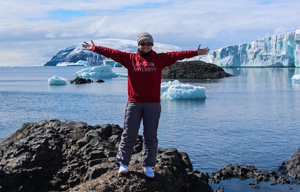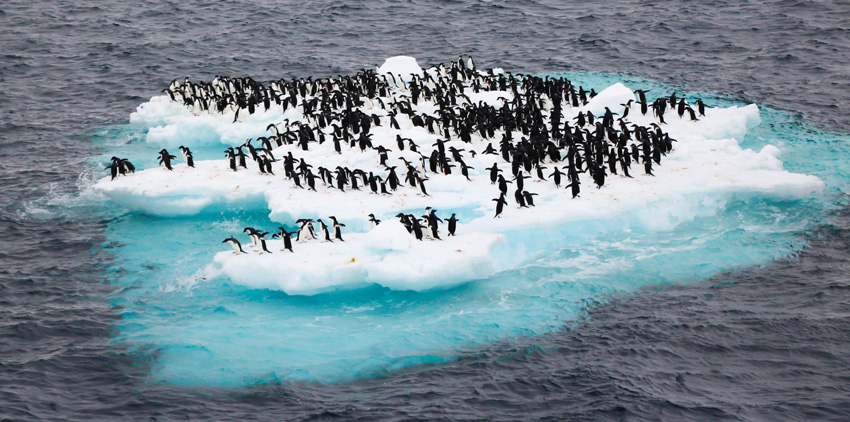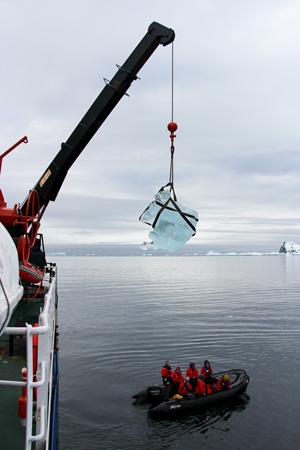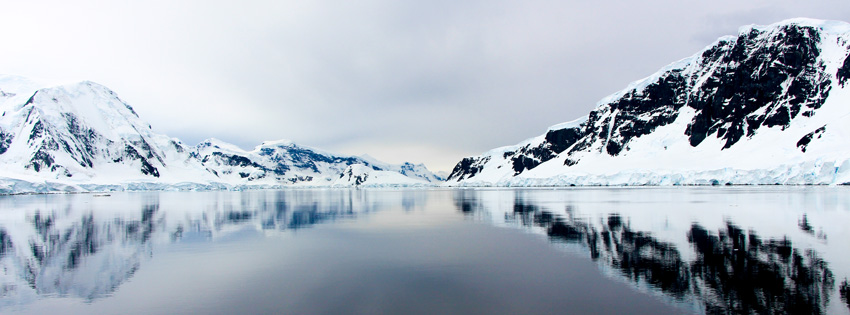Expedition to Antarctica
Alum championing the environment joins largest all-women voyage to land of the penguins
Alum championing the environment joins largest all-women voyage to land of the penguins
Avoiding the penguins would be impossible. The realization sank in as Ida Kubiszewski’s pontoon boat powered her closer to Deception Island in Antarctica. In her briefing, she’d been told to keep more than 15 feet from the wildlife. But the island—named for the water-filled volcanic crater deceptively hidden at its center—was blanketed with birds.

Stepping as carefully as her gum boots and thickly layered clothing would allow, Kubiszewski (CAS’05, GRS’07) began to explore the island’s black volcanic beaches. She quickly learned that if she sat down, making herself small and unthreatening, the penguins just carried on as if she weren’t there—sometimes they even waddled right over her boots.
The human impact on Antarctica isn’t always so benign. Global warming is threatening the penguins’ home. Some species, for example, lay their eggs on the ground: their eggs can’t survive in puddles of rain.
Kubiszewski, an associate professor of public policy at Australian National University, traveled to Antarctica in December 2016 to advance her work showing policymakers the benefits ecosystems provide to humans—and the economic and social costs of damaging them. An expert on ecological economics, she’s a fellow at the National Council for Science and the Environment in Washington, D.C., has been an advisor to the government of Bhutan on ecological and economic issues, and was a negotiator for the Dominican Republic at the UN conferences leading to the historic 2015 Paris climate agreement.
That December, she was taking part in the largest-ever all-women expedition to the continent. Kubiszewski was one of 76 scientists chosen from 1,000 applicants for the three-week trip, which aimed to increase women’s representation at top levels of the scientific community, and their influence on public policy, by boosting their leadership skills and opening networking opportunities. In lectures, informal discussions, and shore excursions, they also learned about the impact of climate change on the planet’s coldest continent.
Kubiszewski studied astronomy and physics as a BU undergrad, then switched to energy and environmental analysis as a graduate student. She began to specialize in ecological economics, a field that views society, ecology, and economy together to consider how they interact and contribute to world problems—like social inequality and environmental damage—and then uses that knowledge to create solutions.

Much of her research focuses on ecosystem services, the benefits the environment offers to people. Rainforests, for example, yield disease-fighting medicines, and watersheds purify drinking water for cities. Kubiszewski says such assets can be worth as much as $125 trillion globally each year, and that these benefits need to be factored into governments’ decisions. She points to New York City as a model. While the city could make money developing the watersheds that naturally filter its drinking water, public officials calculated that the income would fall far short of the billions it would cost to construct and maintain a filtration plant.
In 2010, Kubiszewski began advising the government of Bhutan, working with its king and prime minister on an economic strategy to improve the kingdom’s famous Gross National Happiness through methods such as environmental conservation and sustainable socioeconomic development. In 2011, she worked with the intergovernmental Mekong River Commission, helping it evaluate the benefits and drawbacks of building hydroelectric dams on the river. She suggested alternatives like river turbines that wouldn’t disrupt water flow to rice fields and wetlands, which many people of Southeast Asia depend on for their livelihoods.
“Part of my work is getting that idea—that nature does have huge benefits to us—through to the public and policymakers,” Kubiszewski says.
From 2013 to 2015, she was part of UN climate change negotiations, helping developing countries find ways to cope with what the UN calls “loss and damage” resulting from climate change. (Loss of lives and infrastructure resulting from sea-level rise and hurricanes are two examples.)
“A lot of what happens with climate change happens not on a national level, but on a regional and state level.”
—Ida Kubiszewski
“Loss and damage was quite controversial,” says Kubiszewski, who was a pro-bono negotiator for the Dominican Republic. Wealthy nations, she says, didn’t “necessarily want to take responsibility for the losses and damages that occur in developing countries, while the developing countries were arguing, ‘Well, because most of the climate change was caused by developed countries and we don’t have the resources to deal with this and it’s for the benefit of the whole planet, is there a way to get some assistance?’ It wasn’t about laying blame, it was about finding solutions to the current problem.” Ultimately, the agreement gave unprecedented recognition to the problem of loss and damage.
The withdrawal of the United States from the accord has been a blow to the international community, but Kubiszewski says it’s also been “the kick in the butt” others may have needed to step up their role in addressing climate change. France and the United Kingdom have pledged to ban sales of diesel and gas cars by 2040, Volvo will make only electric or hybrid cars starting in 2019, and the governors of California, New York, and Washington formed the US Climate Alliance to rally states committed to the Paris Agreement. Every commitment matters. “A lot of what happens with climate change happens not on a national level, but on a regional and state level,” Kubiszewski says.

While Kubiszewski has plenty of experience demonstrating the potential financial and social benefits of investing in river turbines or environmental preservation, calculating the immediate payoffs for saving the remote home of penguins is a tougher ask. Kubiszewski would like to conduct an ecosystem service valuation, which would describe the benefits Antarctica provides to people. This information could help advise governments as they seek to find the right balance between using Antarctica’s natural resources—for fishing and tourism, for example—while protecting it for the future.
“Nobody lives on Antarctica permanently. And yet it’s such a critical part of our world,” says Kubiszewski. “If something changed in Antarctica, there would be massive impacts to our global atmosphere and oceans.”
Warming temperatures, for instance, may be a factor in the separation of massive icebergs from the continent’s ice shelves—a chunk roughly the size of Delaware broke off in July 2017. Losing so much mass can weaken an ice shelf and cause it to collapse, raising sea levels and threatening coastal communities around the world. As Kubiszewski learned from experts lecturing on the trip, Antarctica is also home to a large krill population, a major food source for penguins, seals, humpback whales, and other creatures. People use it, too: valued for its healthy fatty acids, krill oil is sold as a dietary supplement. But rising ocean temperatures have contributed to a 70 to 80 percent decline in adult Antarctic krill over the last 40 years, according to Scientific American. If coupled with overfishing, the decline could deplete the krill market and jeopardize the food chain.
Some penguin species are already feeling the impact of a warming climate, moving south as higher temperatures reduce their food supply and damage nesting sites. By the end of the 21st century, the Adélie penguin population—which lives across Antarctica—could be forced into steep decline, according to a NASA-funded study published in Scientific Reports in 2016.

The goal of the organization behind the Antarctica expedition, Homeward Bound, is to draw more women like Kubiszewski into leadership roles in the scientific fields that are looking for solutions. It can help encourage women to build the confidence to advance their careers, whether by networking or advocating for promotions. Kubiszewski pushes past anxiety in such situations by telling herself, “What’s the worst that could happen?”
As Kubiszewski helps policymakers recognize how important ecosystems are to humanity’s survival, she’s paving the way for future leaders. It’s not too different from how Antarctic penguins settle nesting sites. “Sometimes the first patch of bare ground after melting is at the top of these massive, thousand-meter hills. And so, these penguins waddle up there and create these paths,” she says. “One comes in, and it’s really hard because he sinks up to his neck. But for the next one that follows, it’s a little easier.”